Originally published by: Moody College of Communication, The University of Texas at Austin
Original author: Mary Huber, Communications Coordinator
Originally published on: April 12, 2022
A look back at Moody College's second annual Diversity in Media Symposium
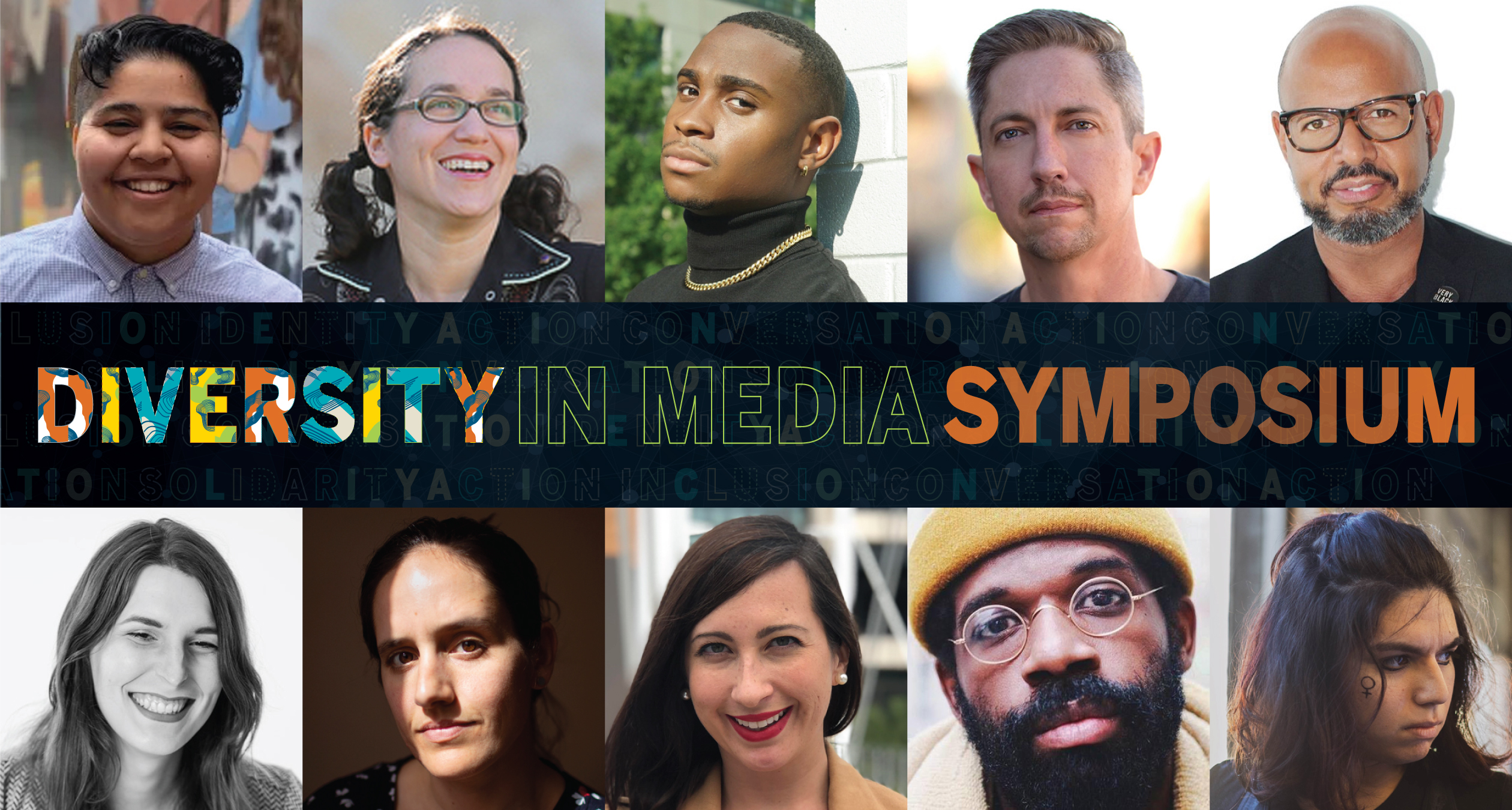
For the past few years, the Moody College of Communication has been working to expand conversations around diversity, equity and inclusion and how to achieve these in today’s media landscape. Last week, at the second annual Diversity in Media Symposium, we heard from LGBTQIA+ athletes, photographers, filmmakers and other creatives. They shared their struggles in the writer’s room, among film executives and on the field, and what they’ve done to make a name for themselves, while also carving out space for other queer and trans people to succeed. If you missed the event, check out summaries of the four panels below or watch the full videos.
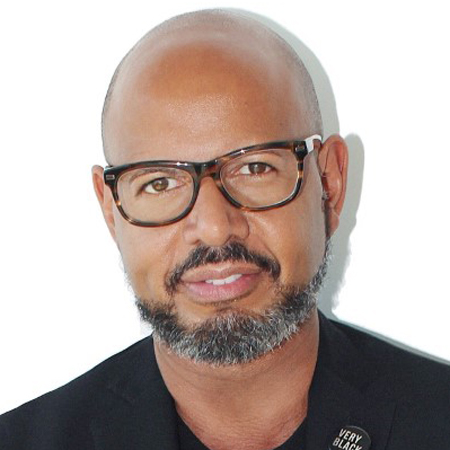 Keynote: A Conversation with Emil Wilbekin
Keynote: A Conversation with Emil Wilbekin
Featuring Emil Wilbekin, former editor in chief of Vibe Magazine and founder of Native Son, a platform created to inspire and empower Black gay men
When Emil Wilbekin got the call to become editor in chief of Vibe Magazine, he knew he would face challenges as a Black gay man taking the top leadership position. Until that time, he had been the fashion editor at the magazine. “When I was in fashion, it was OK to be gay,” he said during his keynote address. But when he became editor in chief, he said, people questioned whether he had the right to be there.
A graduate of Columbia’s School of Journalism and an expert in editorial creation, content curation and multimedia storytelling, Wilbekin in his role helped to change the narrative around Black gay men in the hip hop world, where he said they had been living for a long time in the shadows. “Even though we weren’t supposed to be in those spaces, we were,” he said. “It’s if people care to see us or not.”
Wilbekin went on to create Native Son, a global platform to inspire and empower Black gay men by elevating their stories and building community. The movement was borne of his experience in Black churches and coming out about being gay and HIV positive to his family. At the symposium, Wilbekin shared candidly about his mothers’ rejection of him, a subsequent wound that followed his adoption. “Something broke in me in that process, and in that break, I think I realized that I would have to advocate for myself.”
Today, Wilbekin helps to give queer men a voice and to celebrate their contributions. “Black queer folks have been at the forefront of every social justice movement,” he said. “We have laid the groundwork for media, film and TV and music and never got the credit.”
When asked about a piece of literature that still affects his life and how he approaches the world, Wilbekin named James Baldwin, activist and author of “Notes of a Native Son.” The line in particular: “The place in which I will fit will not exist until I create it.”
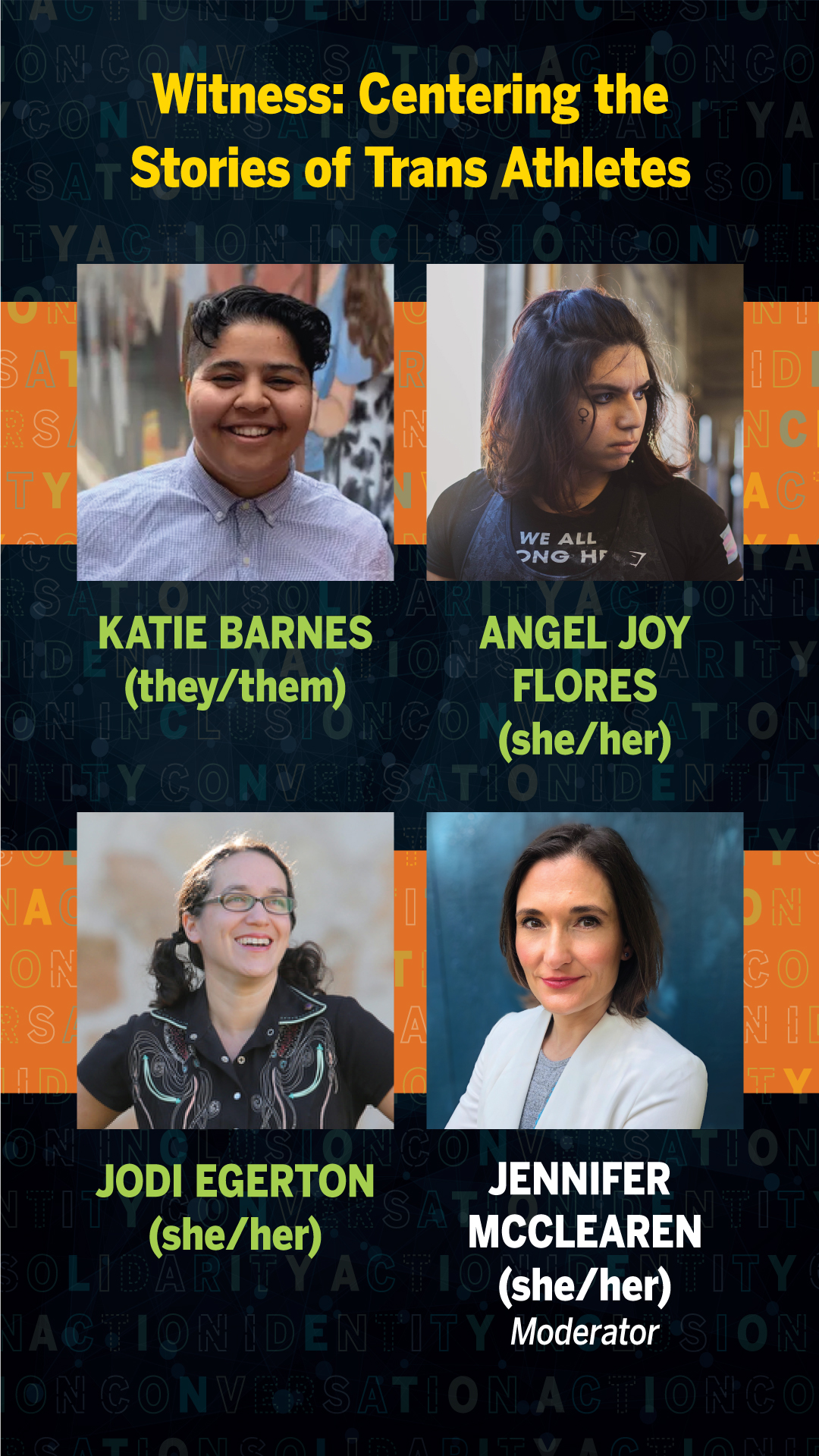 Witness: Centering the Stories of Trans Athletes
Witness: Centering the Stories of Trans Athletes
Featuring ESPN feature writer Katie Barnes, trans athlete and advocate Angel Flores and mother of a 13-year-old trans athlete Jodi Egerton
On the heels of the passage of Texas House Bill 25, which requires many student athletes to play on sports teams that are related to their sex assigned at birth, transgender athletes and their advocates came together in a panel to address misconceptions about the law and to talk about the importance of sports in building community.
Katie Barnes, a feature writer at ESPN who covers LGBTQ issues and culture, said many people are misinformed about how the legislation will affect the transgender community, and that they conflate issues related to Olympic-style competition with the majority of athletics in the U.S. “Our overwhelming experience of sports is mostly genderless, co-ed and mostly recreational. That is true whether we are talking about kids or adults, roller derby, a cross fit gym, co-ed softball,” they said. “The competition of sport is often the driver of the conversation when it comes to regulations rather than the reality of recreation and community.”
They and other panelists shared their own experiences of building community through sports — on the court, in the gym and watching playoff games after Sunday potlucks. Angel Flores, a powerlifter who was recently featured on the Netflix show “Queer Eye,” described the experience when she found her home gym and was able to train alongside fellow trans athletes, calling it “unmatched.” She also dispelled some of the misinformation surrounding athletics and the transgender community, detailing the changes that happened to her body and her progress in the gym as she began to take hormones. Her hands shrunk. She lost shoe sizes. And when she went to the weight room, she couldn’t lift anywhere near the amount she could prior.
“For those who don't understand, or just don't have enough information about trans women in sport, the biggest thing I can tell you is I have to put the exact same amount of work in as anyone else,” she said.
Flores said that sports, as a system, operates with the assumption that there is a limited amount of room for everyone. She argued how important it is to operate from an assumption that there can be more for everyone. “There is no girl strength. If you are a girl, you have your own strength. If you are a boy, you have your own strength,” she said. “We shouldn’t be focused on who is the largest and strongest. You have individual skills and size, and you have a place within sports somewhere.”
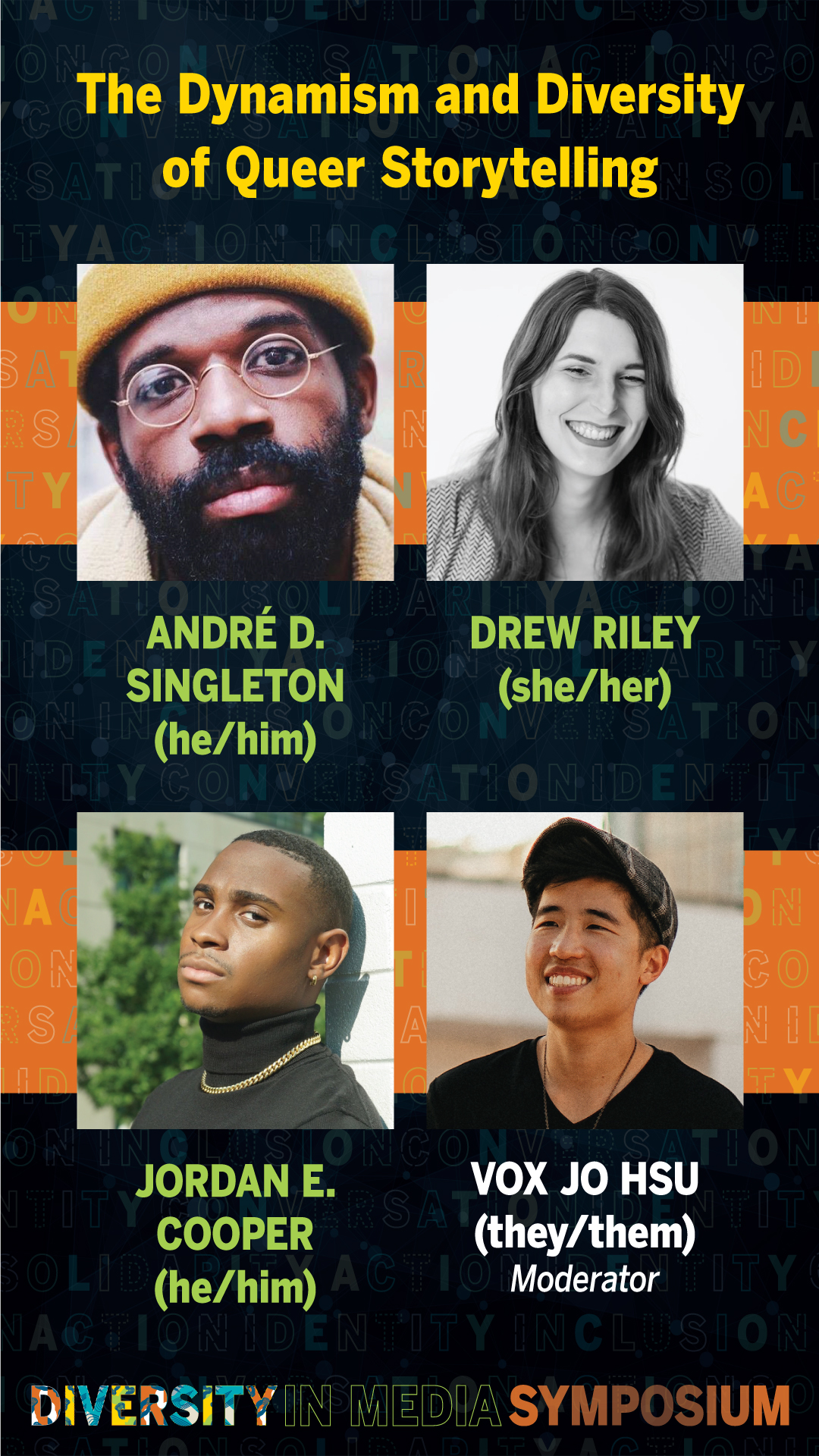 The Dynamism and Diversity of Queer Storytelling
The Dynamism and Diversity of Queer Storytelling
Featuring human rights activist André Singleton, OBIE Award winning playwright and performer Jordan Cooper and award-winning artist Drew Riley
While art is designed to share queer stories with the public, the artists in this panel admitted that, for them, it was also important to understanding their own identities and to create a community for themselves where there was none.
When Drew Riley started her series “Gender Portraits,” which pairs acrylic paintings with written accounts of trans, intersex and gender nonconforming people, she said she only knew two other trans people. “It’s baffling now looking back on it,” she said. “I had been spending a huge chunk of my life searching for people like me and coming up empty. My work gave me the gift of community, and I ended up knowing hundreds of people like myself.” Her goal is to give other people that same feeling of community in her own work.
She admitted it can be scary, being so “vulnerably queer and vulnerably trans.” And there’s always the thread of backlash. But she encouraged other artists to press on even if they feel afraid. “You can’t wait for everybody to be on board with what you do because you are going to wait forever,” she said. “If I had to wait for everyone to be OK with my transition, I would have never transitioned.”
André Singleton, co-creator of "The Very Black Project," a social awareness initiative that celebrates the African Diaspora, echoed how being brave and sharing your story can help others feel understood and like they belong. “You have to know where you come from and think about the fact that somebody else has felt how you’ve felt,” he said.
Jordan Cooper, an award-winning playwright and performer, in the panel described his own internalized homophobia growing up in the Dallas-Fort Worth area. It wasn’t until he moved to New York City in 2014 that he discovered a community that gave him permission to “just be.” Until then, he said, he had avoided queerness in his work. Then, he created the character Peaches in his play “Ain't No Mo,” a satire about the departure of Black Americans from the country. “Peaches is just the blackest, queerest, version of myself,” he said. “I just put it all into that character, and I felt like that was enough of an exorcism putting that on paper.”
Since then, he said he’s had to work hard for his art to not just be about queerness. “I, for myself, had to dig deeper and just write about the ‘life of’ and not the ‘life about.’”
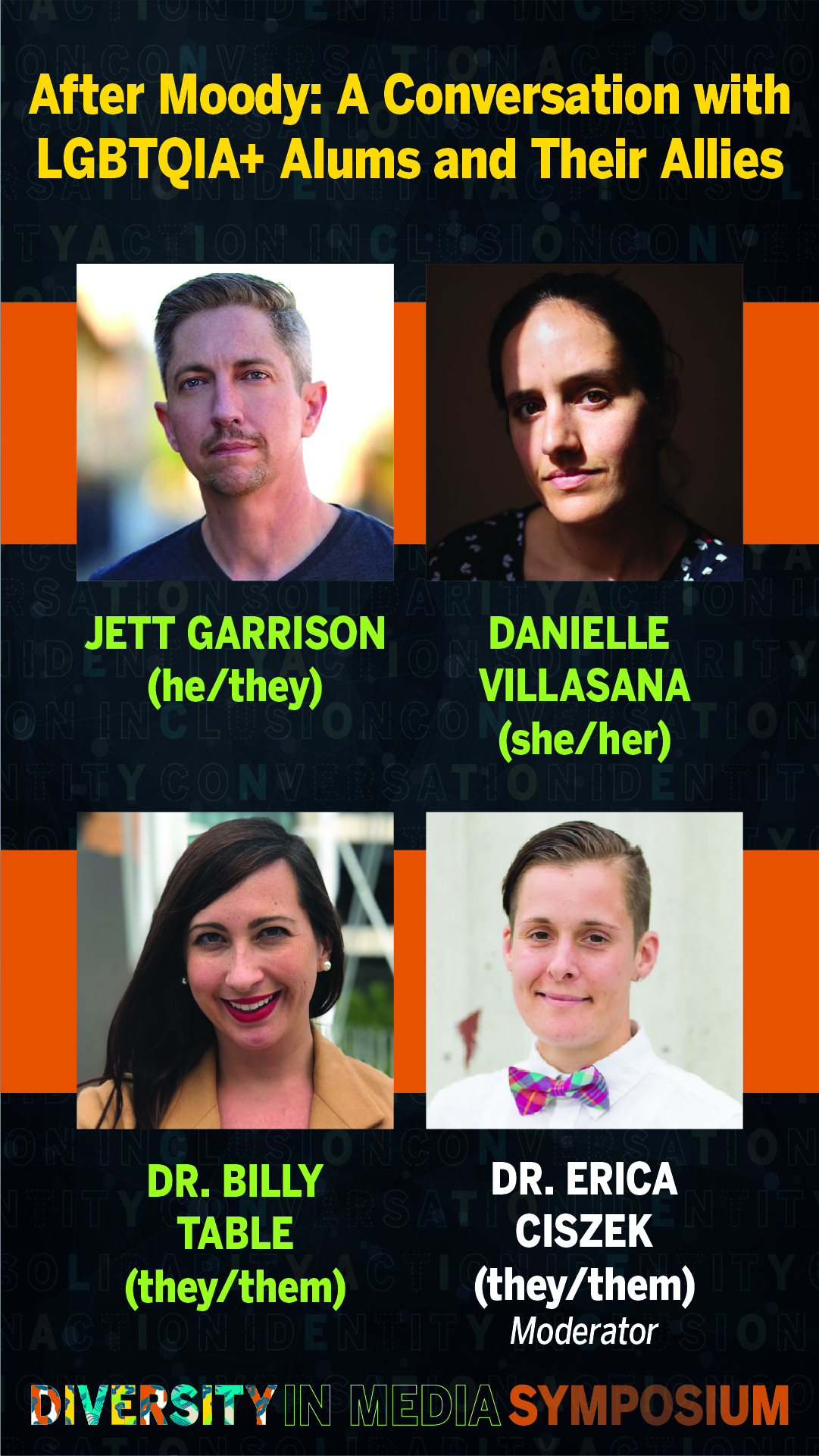 After Moody: A Conversation with LGBTQIA+ Alums and Their Allies
After Moody: A Conversation with LGBTQIA+ Alums and Their Allies
Featuring photojournalist Danielle Villasana, UX research consultant Billy Table and award-winning director, writer and producer Jett Garrison
The last panel at the symposium brought things back home — to right here at UT, talking with LGBTQIA+ Moody College graduates and their allies about their experience working in the media and what advice they would give students starting their careers. In short: know your words are powerful and consider them carefully. If you don’t know something, learn. Tell your story bravely. Ask yourself who isn’t at the table, then give them a seat.
“When I think about ‘What Starts Here Changes the World,’ I think about all the practice I got being an advocate, being in student groups, being a researcher and advocating and bringing the voices of LGBTQIA+ folks into the forefront of social science,” said Billy Table, who earned their doctorate in communications studies at UT in 2020 and now works as a UX research consultant and teaches human sexuality studies. “I remember being a baby grad student and being like, ‘Where are the gays though? Where are the trans people?’ I got to practice using my voice at UT, and now I am out in the world and what I am trying to do is pay it forward.”
That includes being a mentor to those following in their footsteps and championing those who often get overlooked. It was a sentiment shared by all the panelists, including Jett Garrison, an award-winning director who grew up in small-town Texas, who has devoted his career to telling stories of people who have been marginalized in the media. He shared his own struggle to get past the “gatekeepers,” network executives in Hollywood who decide the next TV show or movie that gets made. A queer or trans character is added to check a diversity box. And if there was already a trans show in the docket, there isn’t space for another one. “Until we get executives like us and the broad array of intersectionality, we are not going to have folks that understand the nuances,” he said.
His message for young gay and trans creators: it can be daunting. “But people are hungry for the content we are creating,” he said. “I sometimes I have to remind myself of that. It might not be immediate, but the audience will grow.”
Danielle Villasana, who photographs transgender women in Peru, identified herself as the sole ally on the panel. She stressed the importance of educating yourself. “It is not up to your LGBTQ, Black friend to tell you about these issues that are problematic,” she said. “Do not put that labor on these communities. Educate yourself because it is a continuous evolution. There is not an end point where you get it.”
Garrison welcomed the viewpoint. “You aren’t a tourist in our lives. It is not just a stopover,” he said. “Empowering us benefits everybody. This is a communication. This is a partnership, and we can hopefully tell better stories together and convey better characters together. You can look at it as a win-win. The allies who are starting to champion our stories are starting to see that.”
